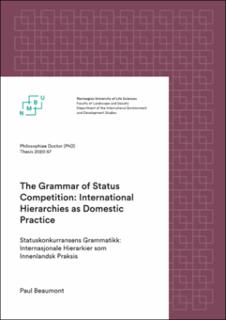The grammar of status competition : international hierarchies as domestic practice
Doctoral thesis
Permanent lenke
https://hdl.handle.net/11250/2736813Utgivelsesdato
2020Metadata
Vis full innførselSamlinger
Sammendrag
A burgeoning body of research has documented that status-seeking abounds in world politics. Yet the status hierarchies to which states respond and compete within are notoriously ambiguous and difficult to empirically ascertain. It is seldom agreed upon where states rank, even within particular policy domains. This ambiguity has begotten considerable disagreement among scholars over the nature of international hierarchies and led to a proliferation of structural theories of international status. Rather than theorizing and investigating the purported effects of fuzzy international social structures, this dissertation posits that international status can be studied via the theories of international status (TIS) that governments and their opponents themselves produce and use to interpret their state’s status. Treating these theories as productive of the world they purport to describe, such a TIS approach foregrounds the interpretative agency of domestic groups to develop and maintain “hierarchies of their own making”, which need not be recognized internationally to become crucial for policy legitimation domestically.
In order to study TIS systematically, this dissertation develops a new meta-linguistic framework for identifying and mapping the use of TIS within domestic politics. Inspired by the Copenhagen School, this Grammar of Status Competition framework defines status competition by its peculiar processual-relational logic rather than substantive indicators. This enables the analyst to avoid reifying the rules of the hierarchy prior to analysis, and illuminate contestation and change in the TIS that circulate and inform policy debates. Further, because TIS are manifested and observable in discourse, this approach avoids prior works’ reliance upon proxies for inferring international collective beliefs. The usefulness and transferability of this approach is demonstrated via three deliberately different case studies: how rival TIS were involved in the (de)legitimation of (1) Norwegian education reforms at the turn of the 21st century; (2) the United States various negotiating positions during the Strategic Arms Limitation Talks between 1969 and 1980, and (3) the prosecution of Britain’s war with the Boer between 1899-1902. Among, other insights, the dissertation provides plausible answers to three major puzzles in IR status research: why states compete for status when the international rewards seem ephemeral; how states can escape the zero sum game associated with quests for positional status; and how status scholars can overcome the methodological problem of disentangling status from other motivations. Finally, the dissertation argues that ambiguity around status is itself is a social good that international society would be prudent to cherish rather than strive to eliminate.

